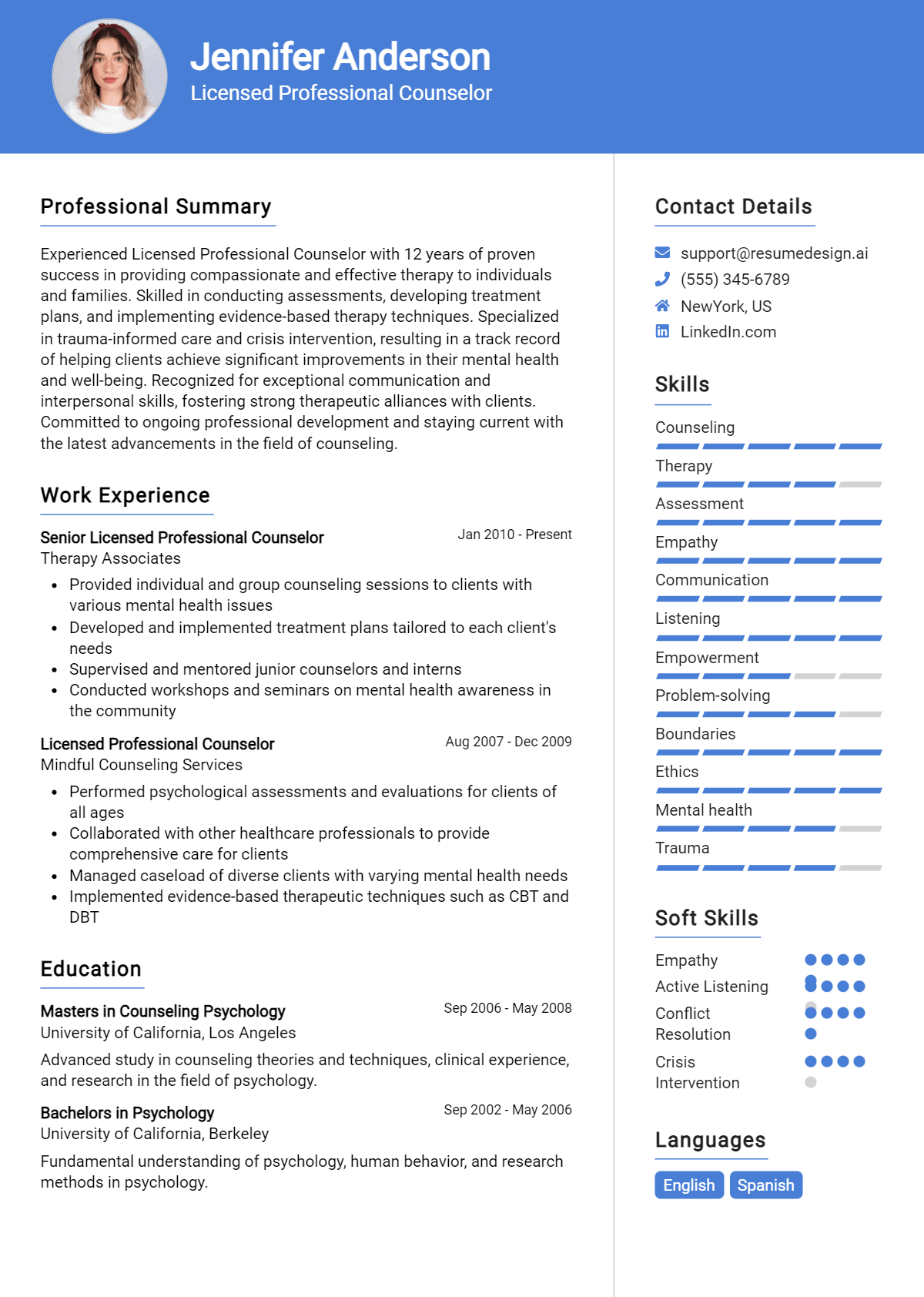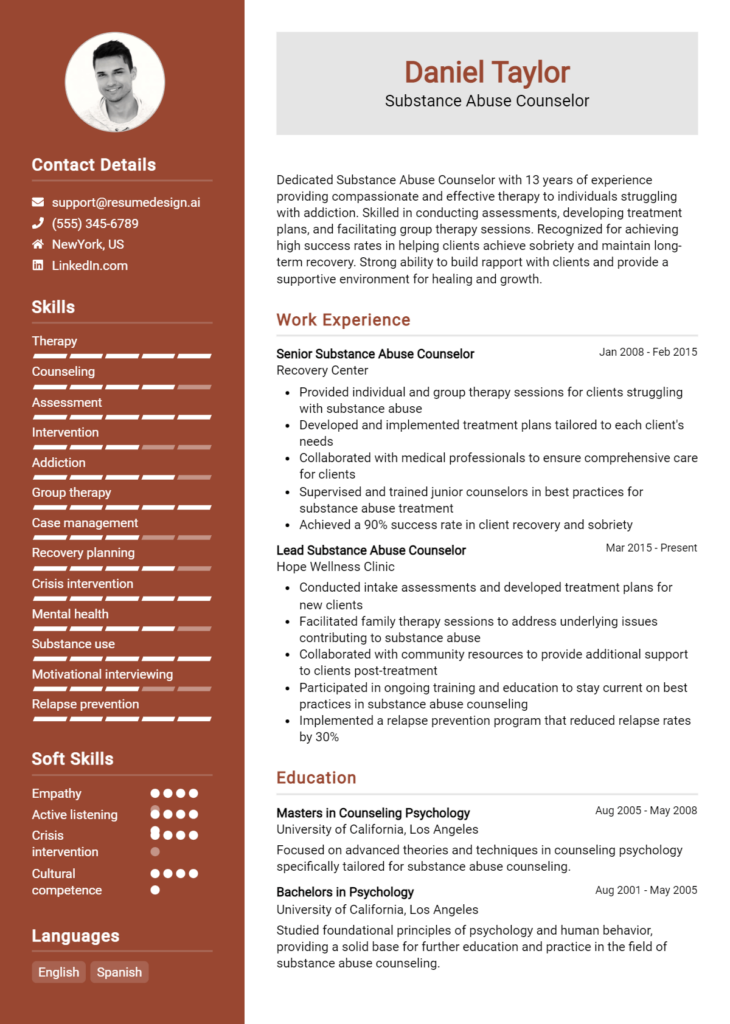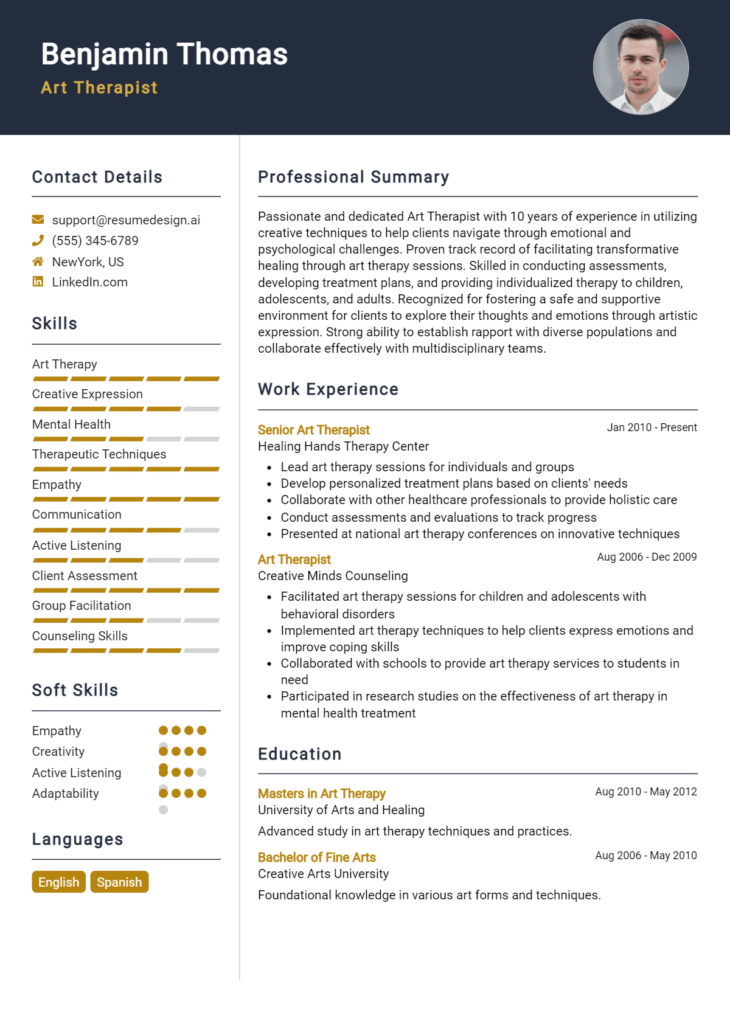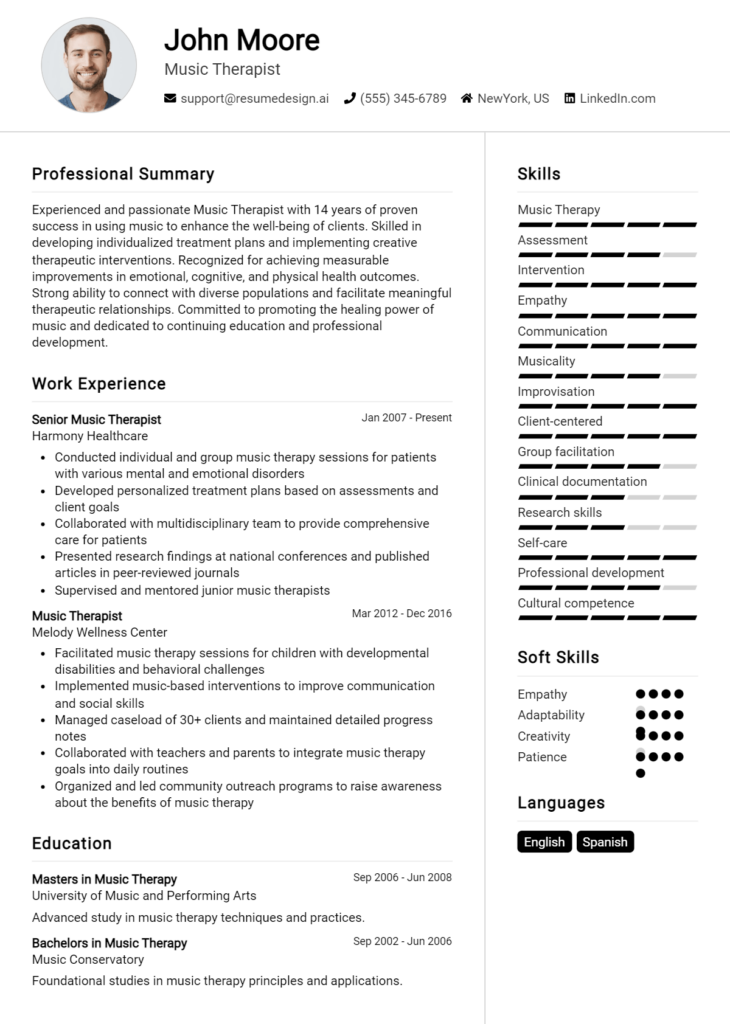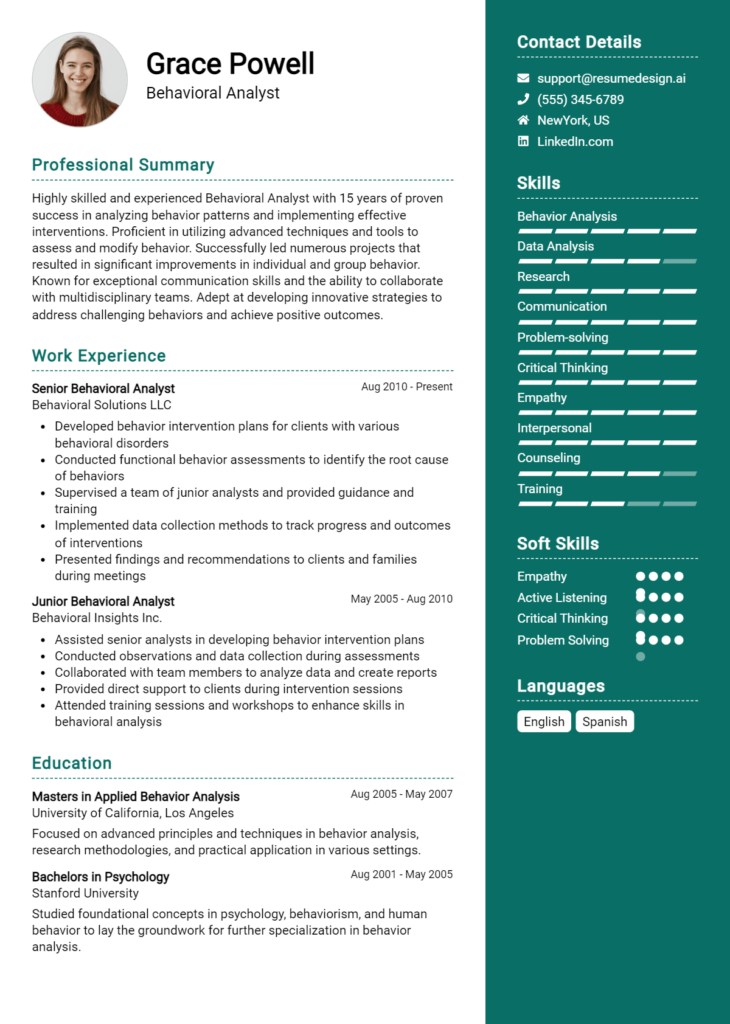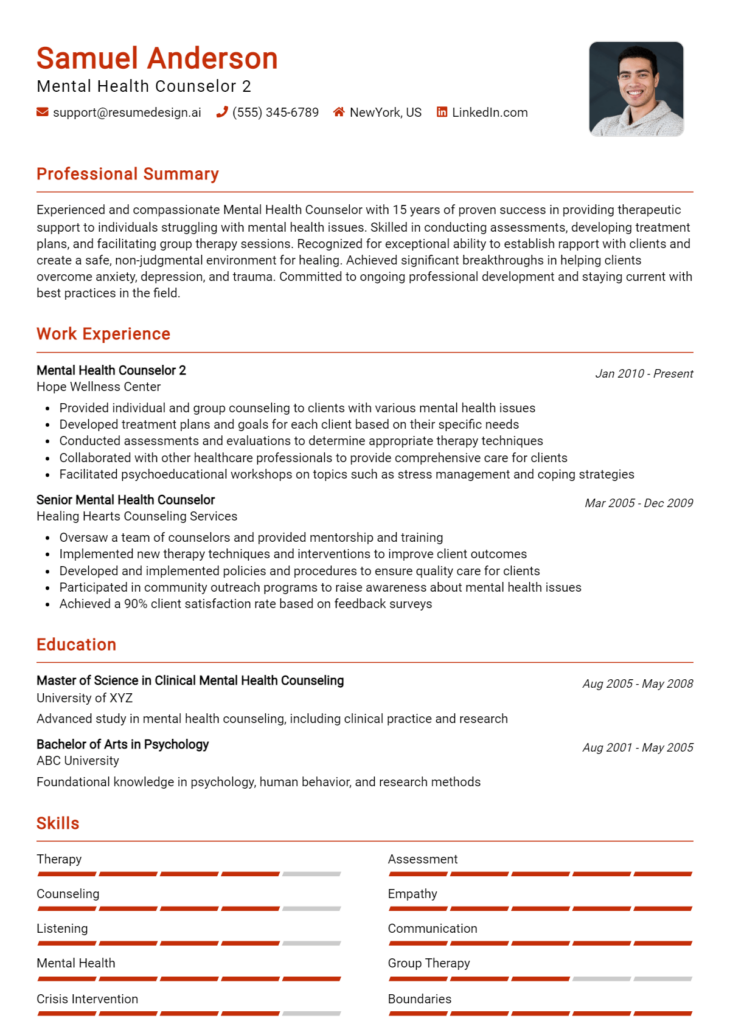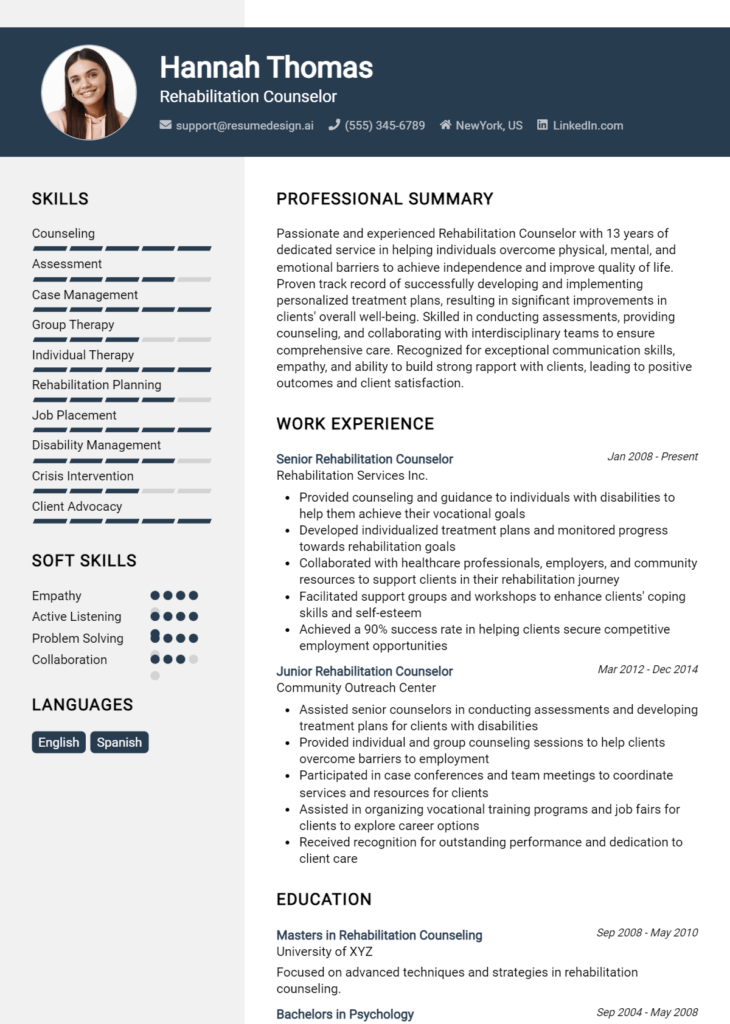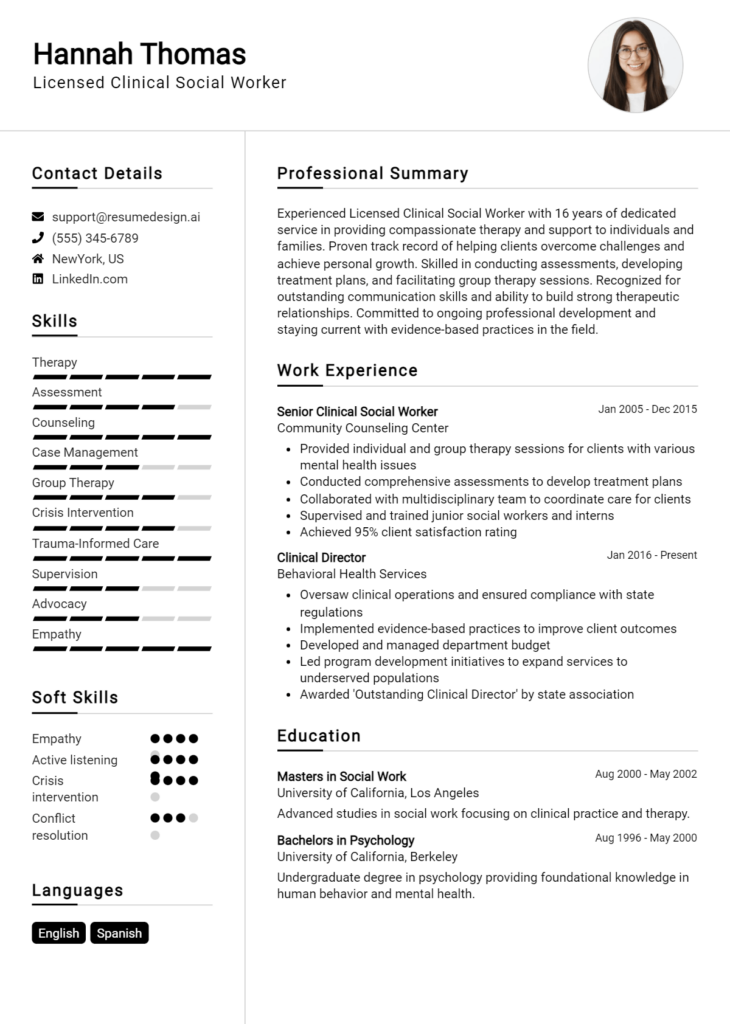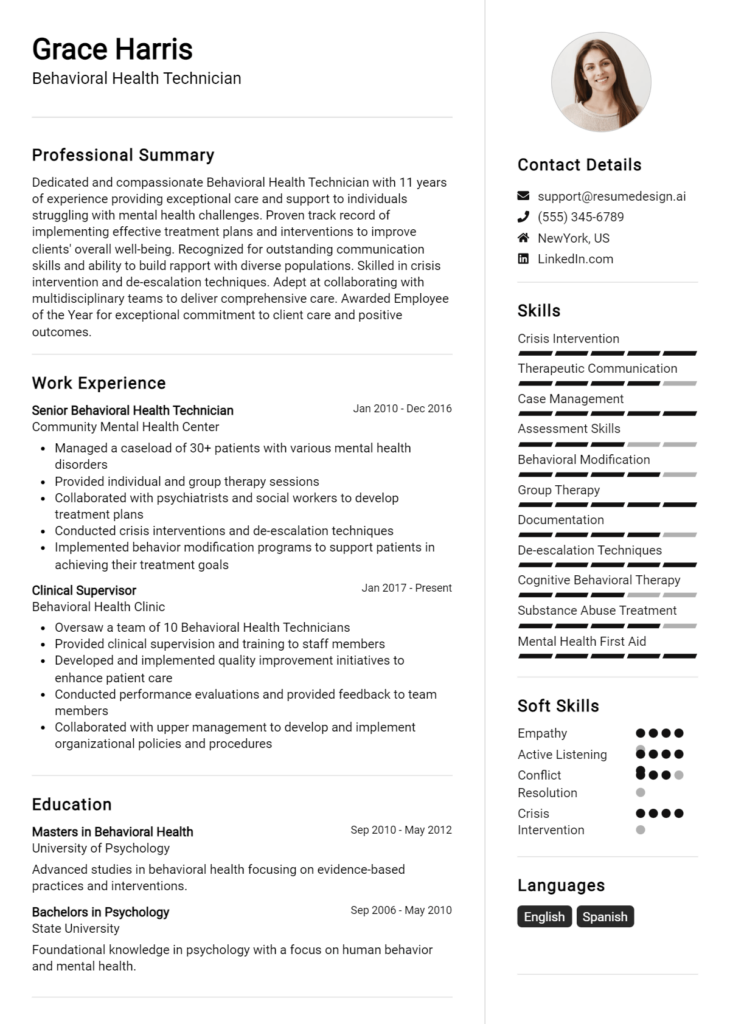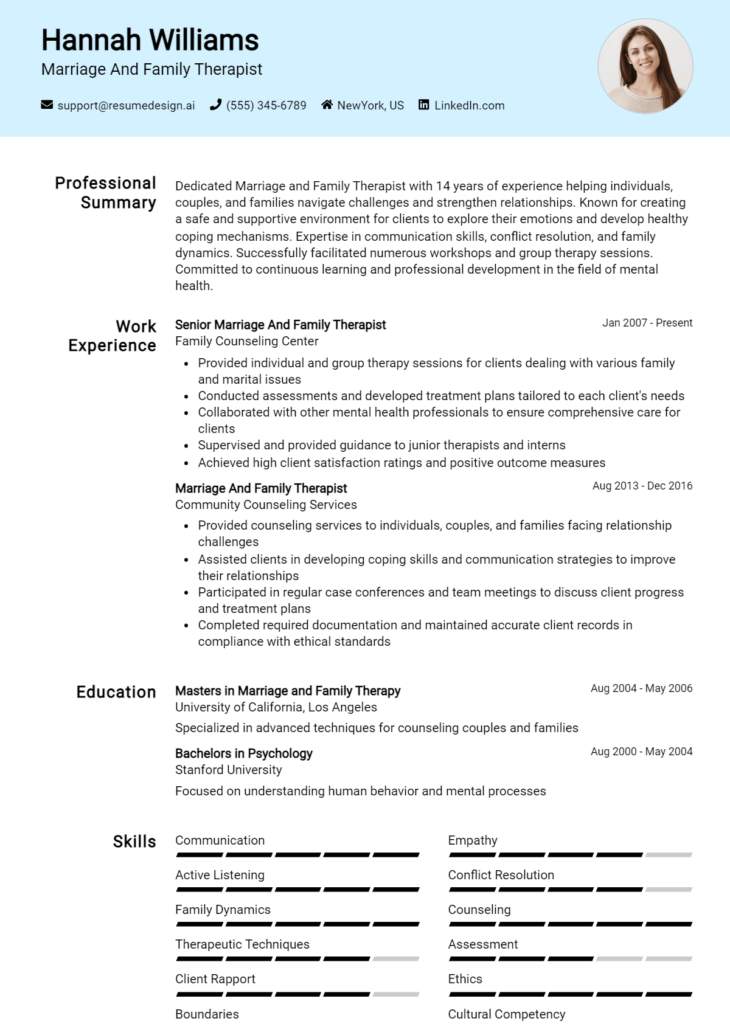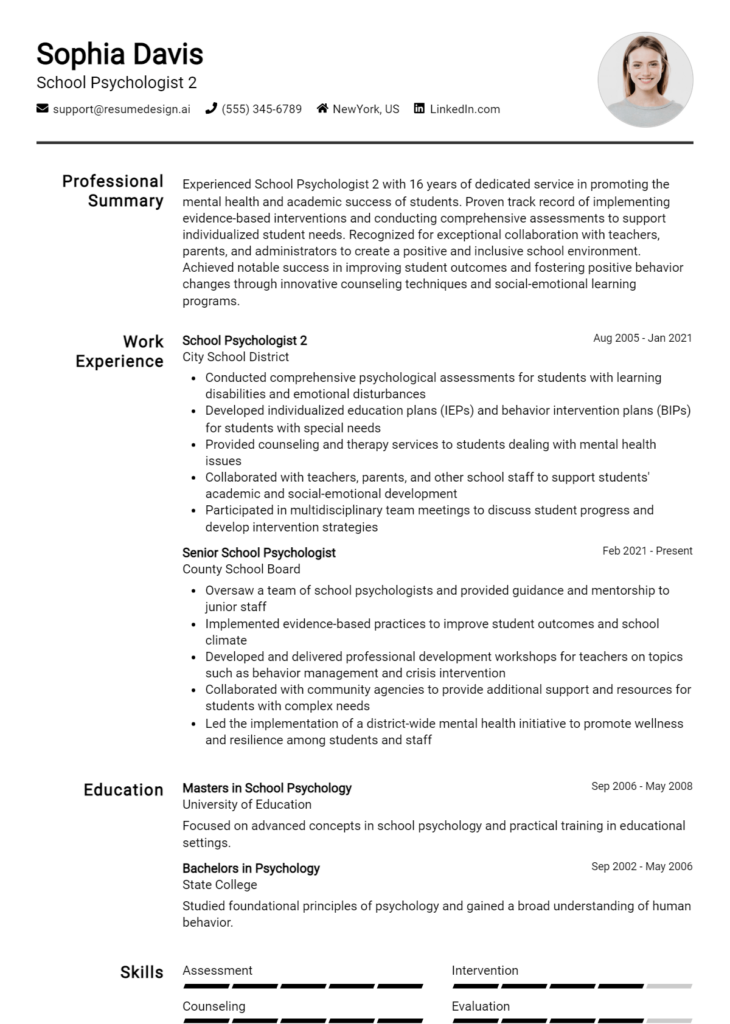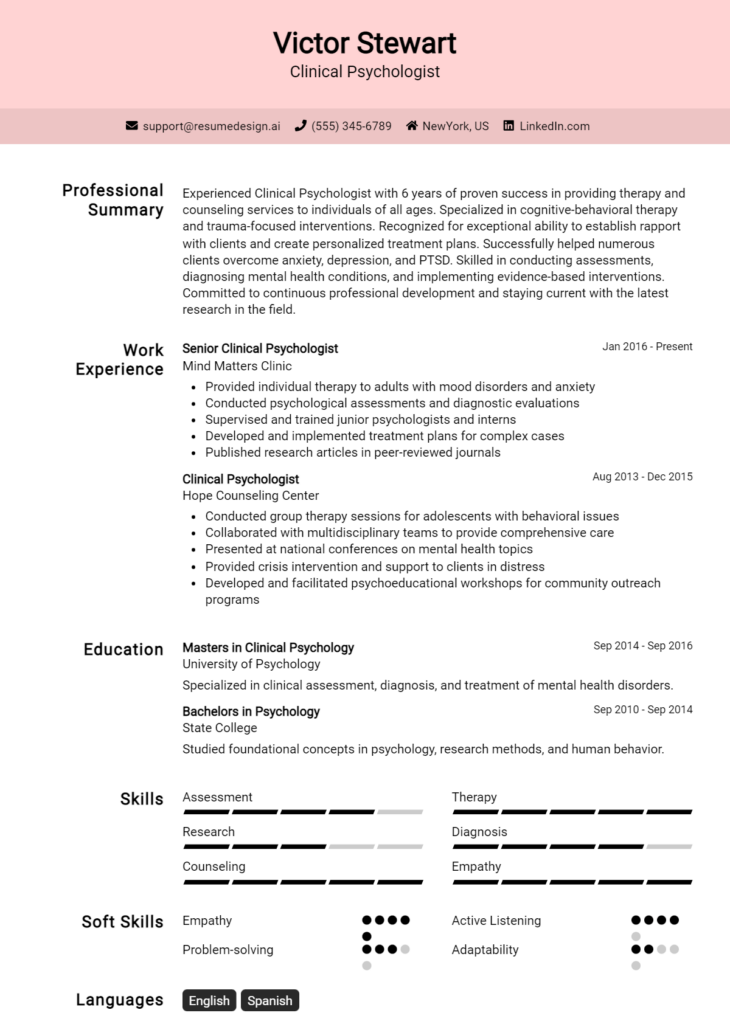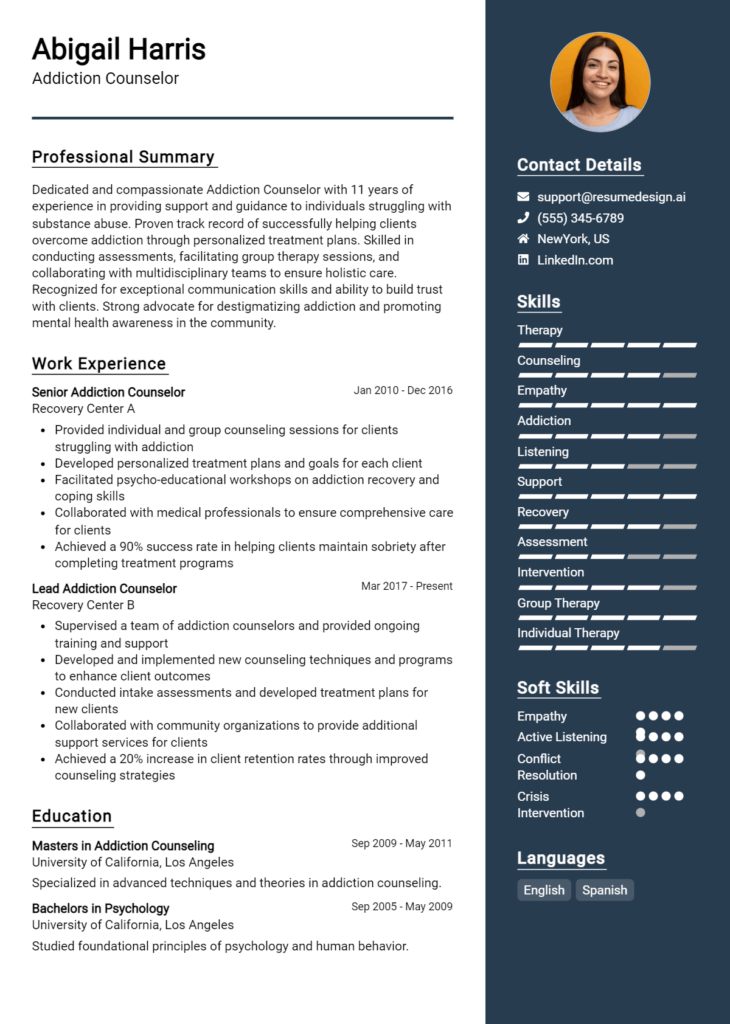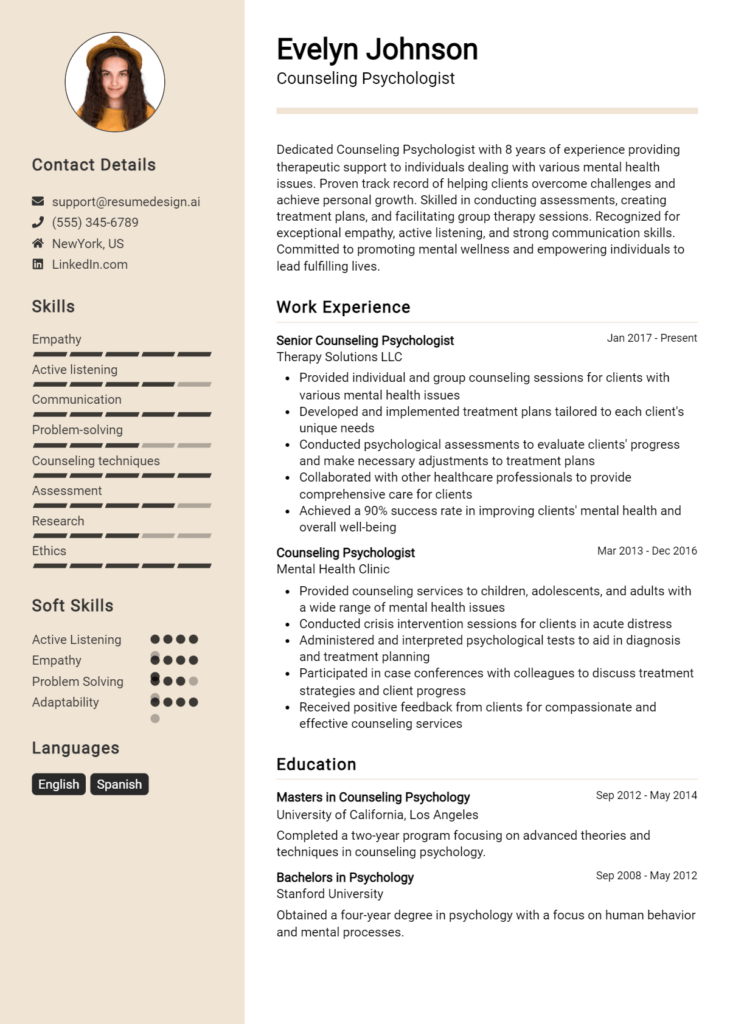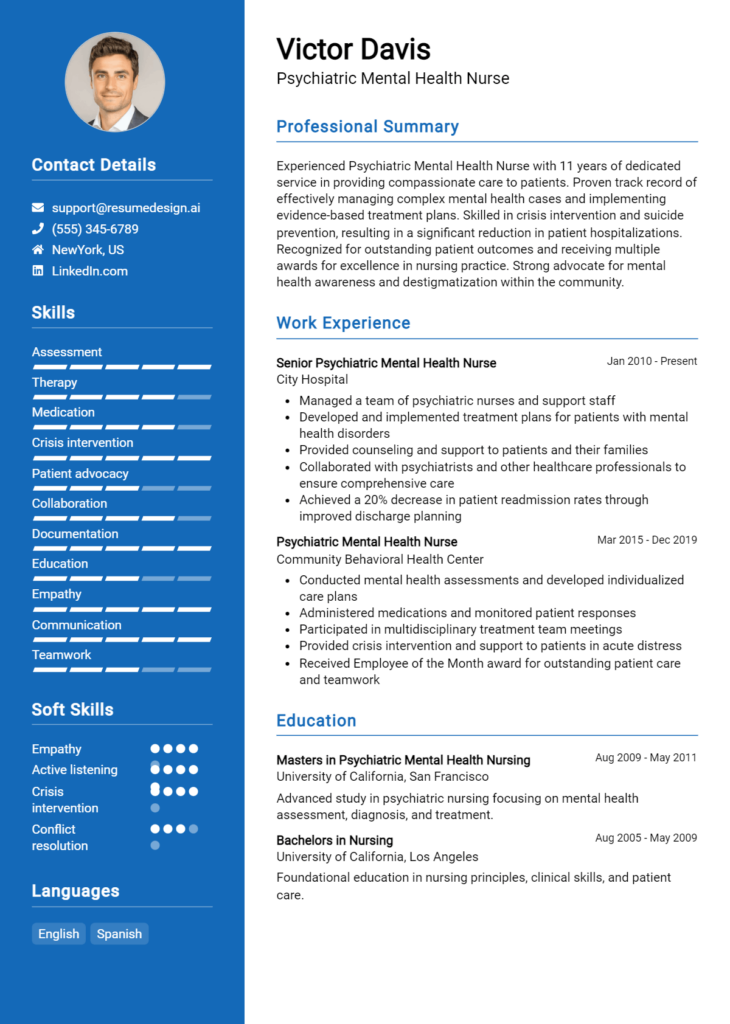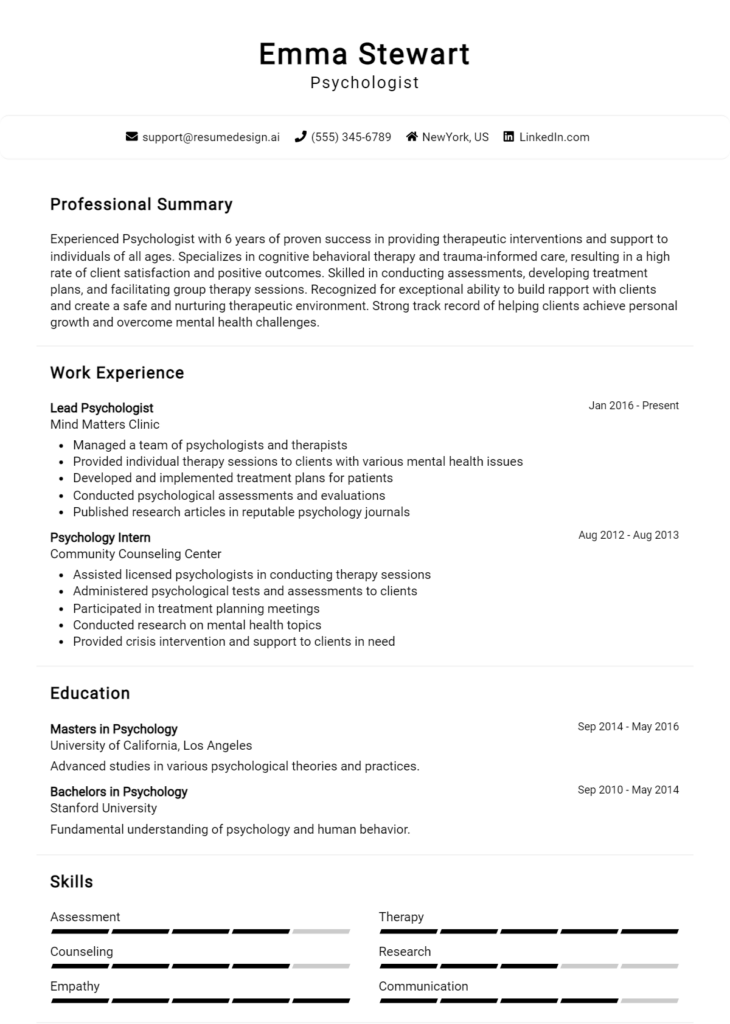Licensed Professional Counselor Core Responsibilities
Licensed Professional Counselors (LPCs) play a vital role in bridging mental health services with various departments, such as healthcare, education, and social services. Their key responsibilities include assessing clients' needs, developing treatment plans, and providing therapy. Essential skills include strong communication, empathy, and problem-solving abilities, enabling LPCs to navigate complex client situations and collaborate with multidisciplinary teams. A well-structured resume effectively highlights these qualifications, showcasing how they contribute to the organization's overall goals of enhancing mental wellness and support.
Common Responsibilities Listed on Licensed Professional Counselor Resume
- Conducting individual and group counseling sessions
- Developing and implementing personalized treatment plans
- Assessing clients' mental health through interviews and evaluations
- Documenting client progress and maintaining accurate records
- Collaborating with healthcare providers and other professionals
- Providing crisis intervention and support
- Facilitating workshops and educational programs
- Staying updated on best practices and ethical guidelines
- Engaging in continuous professional development
- Advocating for clients' needs and resources
- Conducting research on mental health trends and issues
- Supervising interns or trainees in clinical settings
High-Level Resume Tips for Licensed Professional Counselor Professionals
In the competitive field of mental health services, a well-crafted resume is essential for Licensed Professional Counselors (LPCs) to make a strong first impression on potential employers. Your resume serves as a powerful marketing tool that not only highlights your qualifications but also showcases your unique skills and achievements in a way that aligns with the needs of the hiring organization. Given that many hiring decisions are made based on this initial document, it is vital for LPC professionals to present their experience and expertise effectively. This guide will provide practical and actionable resume tips specifically tailored for Licensed Professional Counselor professionals to help you stand out in a crowded job market.
Top Resume Tips for Licensed Professional Counselor Professionals
- Tailor your resume to each job description by incorporating relevant keywords and phrases that reflect the specific requirements of the position.
- Showcase your counseling experience, including internships, volunteer work, and any specialized training, to demonstrate your hands-on skills.
- Quantify your achievements where possible, such as the number of clients served or improvement rates among clients, to provide concrete evidence of your impact.
- Highlight industry-specific skills such as crisis intervention, cognitive-behavioral techniques, and evidence-based practices that are in demand.
- Include relevant certifications, licenses, and continuing education courses to show your commitment to professional development.
- Utilize a clean and professional format that enhances readability, making it easy for employers to quickly identify key information.
- Incorporate a summary statement that succinctly encapsulates your professional identity and what you bring to the role.
- List any additional languages spoken or cultural competencies that can enhance your ability to work with diverse populations.
- Be mindful of grammar and spelling; errors can create a negative impression and undermine your professionalism.
By implementing these tips, you can significantly enhance your resume and increase your chances of landing a job in the Licensed Professional Counselor field. A polished and strategically crafted resume not only reflects your qualifications but also positions you as a strong candidate ready to make a positive impact in the mental health community.
Why Resume Headlines & Titles are Important for Licensed Professional Counselor
In the competitive field of counseling, a well-crafted resume headline or title is essential for Licensed Professional Counselors (LPCs) seeking to stand out to hiring managers. A strong headline serves as an initial hook, capturing attention and summarizing key qualifications in a concise manner. It provides a snapshot of the candidate’s expertise, making it easier for employers to quickly assess their fit for the role. By aligning the headline with the specific requirements of the job being applied for, LPCs can enhance their chances of making a lasting impression and securing an interview.
Best Practices for Crafting Resume Headlines for Licensed Professional Counselor
- Keep it concise: Aim for a headline that is brief, ideally one to two lines long.
- Make it role-specific: Tailor your headline to reflect the specific position you are applying for.
- Highlight key qualifications: Use impactful words that showcase your primary skills and experiences.
- Use action-oriented language: Start with a strong action verb or an impactful adjective.
- Avoid jargon: Ensure that your headline is easily understood by hiring managers outside of your immediate field.
- Be honest and authentic: Your headline should accurately represent your qualifications and experience.
- Incorporate relevant keywords: Use industry-specific terms that align with the job description to enhance visibility.
- Test different options: Experiment with various headlines to see which resonates best with your target audience.
Example Resume Headlines for Licensed Professional Counselor
Strong Resume Headlines
Compassionate Licensed Professional Counselor Specializing in Trauma-Informed Care
Dedicated LPC with 5+ Years of Experience in Adolescent Mental Health
Results-Driven Counselor Focusing on Cognitive Behavioral Therapy Techniques
Licensed Professional Counselor with Proven Skills in Crisis Intervention and Family Therapy
Weak Resume Headlines
Counselor Looking for a Job
Professional with Experience in Counseling
Strong headlines are effective because they immediately convey the candidate's unique strengths and qualifications, creating a compelling first impression. They are specific, impactful, and tailored to the role, which helps hiring managers quickly recognize the candidate's relevance to the position. In contrast, weak headlines lack specificity and fail to communicate the candidate's capabilities; they come across as generic and uninspired, making it difficult for hiring managers to see the value the candidate could bring to their organization.
Writing an Exceptional Licensed Professional Counselor Resume Summary
In the competitive field of mental health counseling, a well-crafted resume summary is essential for Licensed Professional Counselors (LPCs) seeking to make a strong first impression. A powerful summary serves as a professional snapshot that quickly captures the attention of hiring managers, highlighting key skills, relevant experience, and notable accomplishments. By succinctly conveying the candidate's qualifications and what they bring to the table, a compelling summary can set the tone for the rest of the resume, making it crucial to tailor this section specifically to the job being applied for.
Best Practices for Writing a Licensed Professional Counselor Resume Summary
- Quantify achievements: Use numbers and statistics to highlight your impact on clients and organizations.
- Focus on relevant skills: Identify and emphasize the skills that align with the job description.
- Tailor for each application: Customize your summary to reflect the specific requirements and values of the position.
- Keep it concise: Aim for 3-5 sentences that pack a punch without overwhelming the reader.
- Highlight unique qualifications: Mention any certifications, specialties, or unique experiences that differentiate you from other candidates.
- Use action verbs: Start sentences with dynamic verbs to convey confidence and proactivity.
- Showcase soft skills: Include interpersonal skills such as empathy, active listening, and communication that are crucial in counseling roles.
- Maintain professionalism: Ensure the tone is formal and professional, reflecting the seriousness of the role.
Example Licensed Professional Counselor Resume Summaries
Strong Resume Summaries
Licensed Professional Counselor with over 8 years of experience in providing evidence-based therapy to diverse populations. Successfully reduced client anxiety by 40% through tailored cognitive-behavioral strategies, enhancing overall mental well-being.
Compassionate LPC specializing in trauma-informed care, with a proven track record of facilitating group therapy sessions that improved client engagement by 30%. Recognized for developing individualized treatment plans that lead to a 50% increase in client satisfaction ratings.
Dedicated Licensed Professional Counselor with 10+ years in mental health services, adept at utilizing mindfulness techniques that resulted in a 25% decrease in client relapse rates. Committed to fostering a supportive environment to promote healing and personal growth.
Weak Resume Summaries
Experienced counselor with a lot of knowledge and skills in various therapeutic techniques.
Licensed Professional Counselor who has worked with many clients and has helped them improve their lives.
The examples provided illustrate the difference between strong and weak resume summaries effectively. Strong summaries are specific, quantify achievements, and directly relate to the responsibilities of an LPC, showcasing how the candidate can add value to the prospective employer. In contrast, weak summaries lack detail, fail to highlight measurable outcomes, and come across as overly generic, making it difficult for hiring managers to see the candidate's potential impact on their practice.
Work Experience Section for Licensed Professional Counselor Resume
The work experience section of a Licensed Professional Counselor resume is vital for demonstrating the candidate's expertise and capabilities in the field. This section serves as a platform to showcase technical skills, leadership qualities, and the ability to deliver high-quality therapeutic outcomes. By detailing relevant experiences, candidates can illustrate their proficiency in managing client relationships, employing evidence-based practices, and collaborating with interdisciplinary teams. Furthermore, quantifying achievements and aligning work history with industry standards are crucial for making a compelling case to potential employers, as this not only highlights accomplishments but also reflects the candidate's commitment to professional growth and excellence in counseling.
Best Practices for Licensed Professional Counselor Work Experience
- Use action verbs to begin each bullet point, emphasizing your contributions and impact.
- Quantify your achievements where possible (e.g., percentage improvement in client outcomes, number of clients served).
- Highlight specific technical skills relevant to counseling, such as therapeutic modalities and assessment tools.
- Include examples of team management or collaboration with other professionals in multidisciplinary settings.
- Tailor your work experiences to reflect the job description and required competencies of the position you are applying for.
- Focus on outcomes and results rather than just responsibilities to demonstrate effectiveness.
- Showcase continued professional development, such as training or certifications relevant to counseling.
- Be concise and ensure clarity in your descriptions to maintain the reader's engagement.
Example Work Experiences for Licensed Professional Counselor
Strong Experiences
- Implemented a new cognitive-behavioral therapy program that led to a 30% increase in client satisfaction scores over six months.
- Supervised a team of three junior counselors, enhancing their skills through regular training sessions and resulting in improved client retention rates by 20%.
- Developed and facilitated a community outreach program that increased access to mental health services for over 200 underserved clients.
- Collaborated with a multidisciplinary team to design and execute treatment plans, contributing to a 15% decrease in crisis intervention cases.
Weak Experiences
- Worked with clients to provide counseling services.
- Attended team meetings and contributed to discussions.
- Conducted therapy sessions as needed.
- Participated in various training programs throughout the year.
The examples listed as strong experiences are considered effective because they provide concrete metrics and demonstrate a clear impact on client outcomes and team dynamics. They showcase leadership, initiative, and collaboration, which are essential qualities for a Licensed Professional Counselor. In contrast, the weak experiences lack specificity and measurable results, failing to illustrate the candidate's contributions or the skills utilized in their roles. This vagueness can leave hiring managers unimpressed and questioning the candidate's qualifications and effectiveness in their previous positions.
Education and Certifications Section for Licensed Professional Counselor Resume
The education and certifications section of a Licensed Professional Counselor (LPC) resume is crucial as it serves to demonstrate the candidate's academic qualifications and professional readiness. This section not only highlights the educational background that is foundational to effective counseling practices but also showcases industry-relevant certifications that validate the candidate's expertise. Continuous learning through specialized training and coursework further enhances the resume, allowing candidates to illustrate their commitment to professional development. By detailing relevant degrees, certifications, and specific training, candidates can significantly boost their credibility and better align themselves with the expectations of potential employers.
Best Practices for Licensed Professional Counselor Education and Certifications
- Include only relevant degrees and certifications that directly relate to counseling.
- List your highest degree first, followed by any additional relevant degrees.
- Highlight industry-recognized certifications, such as LPC or NCC, to demonstrate credentials.
- Provide specific coursework that pertains to counseling theories, ethics, or techniques.
- Include any specialized training or workshops that enhance your counseling skills.
- Use clear formatting to ensure easy readability and highlight important information.
- Keep the section concise and focused on qualifications that strengthen your application.
- Update this section regularly to reflect new certifications or completed training.
Example Education and Certifications for Licensed Professional Counselor
Strong Examples
- M.A. in Clinical Mental Health Counseling, University of XYZ, 2022
- Licensed Professional Counselor (LPC), State of ABC, License #123456
- National Certified Counselor (NCC), National Board for Certified Counselors, 2023
- Trauma-Informed Care Training, XYZ Institute, 2023
Weak Examples
- Bachelor of Arts in Psychology, University of DEF, 2010 (not an advanced degree for LPC)
- Certification in Basic First Aid, Red Cross, 2019 (not directly relevant to counseling)
- Outdated certification in Substance Abuse Counseling, expired 2021
- High School Diploma, ABC High School, 2005 (not relevant for an LPC)
The strong examples are considered effective because they align closely with the qualifications needed for a Licensed Professional Counselor, showcasing relevant advanced degrees, current certifications, and specialized training that directly relate to the field. In contrast, the weak examples illustrate qualifications that are either outdated, irrelevant, or insufficient for the LPC role, thus failing to provide the necessary credibility or alignment with industry standards.
Top Skills & Keywords for Licensed Professional Counselor Resume
As a Licensed Professional Counselor, showcasing the right skills on your resume is crucial for standing out in a competitive field. Employers look for candidates who not only possess relevant knowledge but also demonstrate the interpersonal qualities needed to build trusting relationships with clients. A well-crafted resume should balance both hard and soft skills, reflecting your ability to provide effective therapy while also engaging with clients empathetically. Highlighting these skills can significantly enhance your chances of securing an interview and ultimately landing the job you desire. For additional insights on how to effectively present your skills, consider exploring skills and work experience sections.
Top Hard & Soft Skills for Licensed Professional Counselor
Soft Skills
- Empathy
- Active Listening
- Communication Skills
- Problem-Solving
- Conflict Resolution
- Patience
- Adaptability
- Compassion
- Cultural Competence
- Emotional Intelligence
- Collaboration
- Trustworthiness
- Motivation
- Professionalism
Hard Skills
- Clinical Assessment
- Treatment Planning
- Crisis Intervention
- Knowledge of Mental Health Disorders
- Psychotherapy Techniques
- Case Management
- Record Keeping
- Familiarity with Ethical Standards
- Familiarity with Diagnostic Tools
- Group Therapy Facilitation
- Research Skills
- Knowledge of Treatment Modalities
- Substance Abuse Counseling
- Trauma-Informed Care
- Behavioral Analysis
Stand Out with a Winning Licensed Professional Counselor Cover Letter
I am writing to express my interest in the Licensed Professional Counselor position at [Company Name] as advertised on [Job Board/Company Website]. With a Master’s degree in Clinical Mental Health Counseling and over [X years] of experience working in diverse therapeutic settings, I am confident in my ability to contribute effectively to your team and support the mental health needs of your clients. My dedication to fostering a safe and supportive environment aligns with your organization’s commitment to providing high-quality care.
During my previous role at [Previous Employer], I successfully managed a caseload of [X clients], providing individual and group counseling to individuals facing various mental health challenges, including anxiety, depression, and trauma-related disorders. My therapeutic approach is grounded in evidence-based practices, including Cognitive Behavioral Therapy (CBT) and Solution-Focused Brief Therapy (SFBT), which I have tailored to meet the unique needs of each client. Additionally, I have collaborated with multidisciplinary teams to develop comprehensive treatment plans, ensuring that clients receive holistic care that addresses their physical, emotional, and social well-being.
I am particularly drawn to [Company Name] because of your innovative approach to mental health care and your commitment to community outreach. I admire your efforts in reducing stigma around mental health and promoting accessible services for underserved populations. My experience in community counseling and advocacy has equipped me with the skills to engage clients from various backgrounds, and I am eager to contribute to your mission of fostering resilience and wellness in the community.
I am excited about the opportunity to join your team and make a positive impact on the lives of your clients. Thank you for considering my application; I look forward to the possibility of discussing how my skills and experiences align with the goals of [Company Name]. Please feel free to contact me at [Your Phone Number] or [Your Email] to arrange a conversation.
Common Mistakes to Avoid in a Licensed Professional Counselor Resume
When crafting a resume as a Licensed Professional Counselor (LPC), it's essential to present your qualifications and experience clearly and effectively. However, many candidates make common mistakes that can hinder their chances of landing an interview. Awareness of these pitfalls can help you create a polished resume that highlights your skills and professional journey. Below are some common mistakes to avoid:
Using a Generic Template: Many candidates opt for one-size-fits-all templates, which can make their application seem impersonal. Tailoring your resume to reflect your unique experiences and the specific job can make a significant difference.
Neglecting Relevant Certifications: Failing to highlight relevant certifications, such as LPC licensure or specialized training, can lead to missed opportunities. Make sure these credentials are prominently displayed.
Overloading with Jargon: While it's important to demonstrate your expertise, using excessive technical jargon can alienate hiring managers. Strive for clarity and ensure that your resume is accessible to a broader audience.
Listing Duties Instead of Achievements: Simply listing job duties can make your resume dull. Focus on your achievements, including measurable outcomes and the impact of your work, to showcase your effectiveness as a counselor.
Ignoring the Importance of Keywords: Many employers use applicant tracking systems (ATS) to screen resumes. Failing to include relevant keywords from the job description can result in your resume being overlooked.
Omitting Continuing Education: Continuing education is vital in the counseling field. Neglecting to mention ongoing training or professional development can suggest a lack of commitment to growth in your practice.
Using Inconsistent Formatting: Inconsistencies in font, size, and spacing can distract from your qualifications. A clean, uniform format enhances readability and conveys professionalism.
Including Irrelevant Information: Adding personal details or unrelated job experiences can clutter your resume. Focus on relevant experiences and skills that align with the counseling position you are pursuing.
Conclusion
As a Licensed Professional Counselor, your resume plays a crucial role in showcasing your skills, experience, and qualifications to potential employers. Throughout this article, we've explored the essential components of an effective counselor resume, including the importance of highlighting relevant certifications, educational background, clinical experience, and specific therapeutic techniques you excel in.
Additionally, we discussed the significance of tailoring your resume to specific job descriptions and utilizing action verbs to convey your accomplishments effectively. Remember, your resume is often the first impression you make on hiring managers, so it's vital to ensure it reflects your professional capabilities accurately.
Now is the perfect time to review your Licensed Professional Counselor resume. With the right tools at your disposal, you can enhance its effectiveness and increase your chances of landing that dream job. Consider utilizing resume templates to get started on a polished layout. If you're looking for a more customized approach, try the resume builder to create a unique resume that stands out. You can also browse through resume examples for inspiration and ideas. Don't forget the importance of a compelling introduction—check out cover letter templates to complement your resume effectively.
Take action today to ensure your resume reflects the best version of you as a Licensed Professional Counselor!

